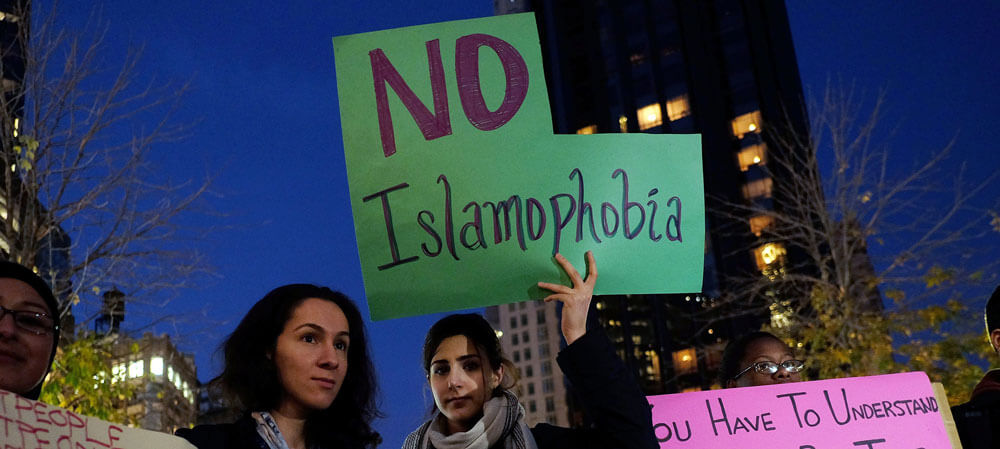Anti Muslim Hate
In many cities, private citizens are putting up anti-Muslim billboards, and elected officials are encouraging residents to fear their Muslim neighbors. Meanwhile, media and national public figures have called to ban Muslims or put them in internment.
These are symptoms of a deeper problem: law-abiding Muslims are treated like a threat. If you are less familiar with this issue, think about this:

- Imagine if your place of religious worship, or the way you dress, made you a target for police. That’s a lived reality for some American Muslims.
- For example, in 2013, we learned that in New York the police have designated entire mosques as “terrorist enterprises” to justify sweeping surveillance of worshippers, including taking pictures and videos of those leaving and entering. Imagine if it was your place of worship.
- In March 2016, a police officer reportedly asked a woman outside a public library in Washington, D.C. to remove her headscarf and threatened her with arrest, pulling out handcuffs, when she refused. Imagine if it was any other religious covering – a yarmulke or cross necklace?
- Youth bear the brunt – especially in bullying and harassment. For example, a 2014 survey of 621 Muslim students in California found that 55% of students reported being bullied based on their religious identity; this is twice as high as students reporting being bullied nationally. Of students wearing an Islamic headscarf, 27 percent reported being discriminated against by their teacher.
- It’s not just police, it’s vigilante-style surveillance. We are living in a culture that encourages citizens to report on each other – and thanks to media depictions and fear-mongering, many people think of American Muslims’ ordinary behaviors as suspicious.
- A high-profile example: In the last year, people have been pulled off planes for speaking on the phone in Arabic or due to vague suspicions based on their appearance.
- In one case, four friends were reportedly pulled off a plane because the captain “felt uneasy and uncomfortable with their presence.” When the friends asked if it was because they were dark-skinned and wore beards, an airline agent reportedly responded that their appearance “did not help.”
- Anti-Muslim fear and hate may contribute to the risk of human rights violations. Public figures stoke fear and hate to justify abusive policies. Over time, they get the public to accept as necessary what was once seen as shocking.
- If it was any other religious group that faced this kind of stigma, surveillance and harassment, many people would denounce it. But today, anti-Muslim discrimination is often considered acceptable—when really, it’s just bigotry.
Here are ways to respond to proposals like Muslim bans or internment (also check out Section II on personal conversations in the Toolkit):
- By bashing Muslims, media and public figures are exploiting our legitimate need for safety to score points and ratings off our worst instincts of fear and prejudice. They are simply using Muslims as a scapegoat.
- We’ve seen this happen in history before, including against Jews, who faced years of anti-Semitism that ultimately led to the Holocaust.
- Most Americans – according to one study, 6 out of 10 – say they don’t personally know any Muslims. It is no wonder many people are so fearful of Muslims: what they know simply comes from media, which is constantly associating Muslims with terrorism.
- In fact, American Muslims are your neighbors, doctors, teachers and customers. They are veterans, entrepreneurs and scientists. Muslims include celebrities like Amal Clooney and One Direction’s Zayn Malik, and athletes like Shaquille O’Neal, Mohamed Sanu and Mohammed Wilkerson.
- American Muslims are a part of this country’s history. As President Obama put it recently, “Muslim Americans helped to build our nation.” New York’s first Islamic Center was built in the 1890s.
- There are an estimated 1.6 billion Muslims in the world and 3.3 million in the United States. Ascribing the actions of armed groups to this many people is illogical and unfair. Instead of blaming Muslims, we should stand in solidarity with Muslims who are themselves the victim of horrific attacks and abuses by armed groups such as the one calling itself the Islamic State, including refugees.
- To treat an entire community as suspect and deprive people of rights based on nonviolent beliefs is wrong and antithetical to human rights and the U.S. Constitution.
- The statistics don’t back up the fear-mongering. The FBI has reported that 250 Americans have traveled or tried to travel overseas to join ISIS; even assuming all those identified were Muslims, that would be a miniscule .0083% of this country’s estimated 3 million Muslims.
To the contrary, according to one study, 2 out of every 5 disrupted terrorism attacks between 2001 and 2011 were based on information provided by Muslim community members.
For more information on countering anti-Muslim hate, please contact us at [email protected]
